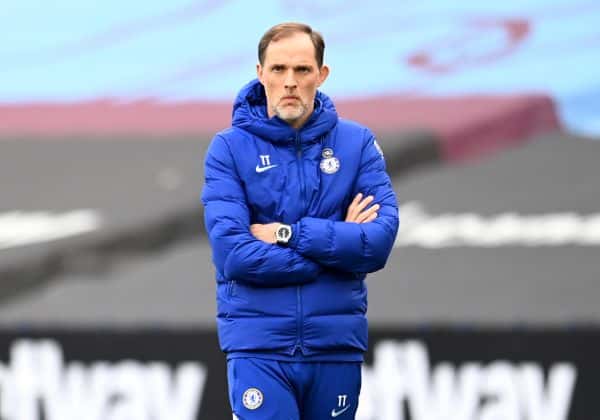Thomas Tuchel’s Chelsea are masters of winning low-scoring games, but struggle to turn the tide after going down a goal.
Christian Pulisic came on, then Kai Havertz and Callum Hudson-Odoi, followed by Olivier Giroud. Mason Mount stayed on. Ben Chilwell powered on. It would be an exaggeration to say that Thomas Tuchel finished the FA Cup final playing 3-1-6, but he probably ended it with the most attacking lineup he has used during his time at Chelsea.
Unsuccessfully, obviously, even if it took a combination of VAR and an inspired Kasper Schmeichel to deny Chelsea an equaliser. But it offered a different view of Tuchel’s Chelsea. They have been defined by control, prevailing in a series of low-scoring games.
Their defensive record has been outstanding, with 12 clean sheets in his first 14 games, but they can argue that does not automatically mean they were defensive. They pressed high; centre backs have followed the men they were marking into midfield at times. At other points, the wing backs have been so advanced they have in effect made a front five.
But they have not been a team configured to chase a game; if they cannot, it may be a failing that undermines their revival. Tuchel’s preference for a double six, two defensive midfielders behind the ball, means they have invariably had a defensive structure with seven outfield players, but they have not found it easy to switch to deploying more men ahead of the ball, to abandoning caution for something more chaotic.
The sample size is small because they have conceded so few goals, and conceded first still less. But, his team have only come from behind twice: against an out-of-form Southampton when their equaliser came from the penalty spot and against a Manchester City team who, due to Pep Guardiola’s rotation producing perhaps the oddest side he has named in five years at the Etihad Stadium, in effect did not have a midfield.
In both cases, Chelsea had time on their side; they went behind in the first half. At the Etihad, they had a trump card, in Reece James – had more been at stake, Guardiola would surely have substituted the struggling Benjamin Mendy earlier.
In both subsequent games, Chelsea have gone behind and not come back: that Arsenal’s early winner came a few minutes after Kai Havertz was guilty of a glaring miss underlined that profligacy can create a problem. Chelsea perfected the low-scoring model of becoming champions under Jose Mourinho but a clinical touch helps. It is harder to win 1-0 when Havertz and Timo Werner have their wasteful tendencies, but their task becomes still tougher when their team contains relatively few attacking personnel, some of whom have a habit of spurning chances.
But there can be a worrying precedent in four stalemates; those against Wolves, Brighton and Leeds were the sort Chelsea might be expected to win. And while the scenario meant they could not go gung-ho, they failed to fashion a breakthrough.
Chelsea have proved they can pick off opponents who are chasing games – think of Emerson Palmieri’s goal against Atletico Madrid and Ben Chilwell’s against Porto – but they have only mustered one result-altering strike themselves in the closing stages under Tuchel: Marcos Alonso’s injury-time decider versus City. They may have been desperately unlucky not to level against Leicester this past Saturday but the model of sedate starts with restrained football limiting the number of chances is predicated on scoring first.
Often, of course, it has worked so well that they have not had to respond: until the past week Chelsea had only gone behind twice and not come back – once with 10 men against West Brom and once when Porto’s injury-time goal was as spectacular as it was late and irrelevant.
The paradox, perhaps, is that their campaign amounts to a comeback: from 10th before Tuchel’s first game kicked off now. They have got this far because they are so rarely trailing.
But their campaign could depend on their powers of recovery. Their three remaining opponents, Leicester, Aston Villa and Manchester City, are the sort with the potential and potency to score first. And whether through tactics or substitutions, mentality or urgency, Chelsea may require a way of coming back. If Tuchel first made them hard to beat, his first few months could be determined by how Chelsea fare when they are losing.





